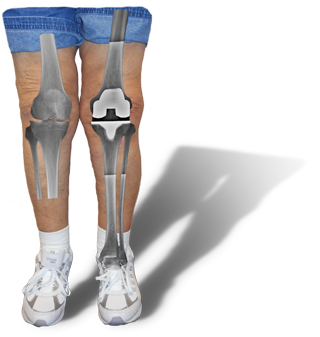
Long time ago, knee pain used to be an old age problem where people who suffered were very few and even lesser population getting knee replacement done. But now there is a dramatic shift in number of people facing the knee arthritis and number of surgeries being performed. Moreover, the age at which these arthritic changes occur has reduced. The changes in the knee seen at around or over 55 years of age are now been observed as low as at 30 years of age.
I consider early knee arthritis similar to premature graying of your hair. Just imagine why do you get grey hair. The reasoning starts with you might be getting older but if it is early then you might be stressed, too much in the sun, not sleeping enough or not eating healthy and may be some genetics.

Similarly, Osteo-Arthritis of knee is a term for inflammation of old age knees. But in early knee arthritis, overloading of joints (especially if your muscles are weak), stress, poor diet or disturbed sleep can disturb your metabolism to deplete calcium from the bones and put your knees under abnormal load and may result in early and faster degeneration. Rheumatism or gout can also eat up your knee joint and make it degenerate early. Last but not the least, a previous injury with unresolved inflammation or infection can lead to early arthritis. The only difference is it is not affected by your genes. Even reduced Vitamin D3 levels in blood can cause degeneration of the joints because it is linked to your bone strength. So either it is simply that you are getting older or you are causing it with bad lifestyle as mentioned above.
I feel this early arthritis of the knee is a major concern because with the speed we are replacing the knees, soon we will have a major population with metallic knees. The world will soon have a workforce of "not so natural" knees.
Are the replaced knees good for your health? I think when your knees are damaged enough to make you stop enjoying life it becomes necessary to undergo knife chopping but only if it is a promising procedure. The question is not whether surgeries are good or bad, it is about whether you need it and if no then what can you do to avoid it.
Now carefully read this paragraph to know your answers. Knee arthritis means the pain and stiffness generated in your knee due to inflammation caused by loss of cartilage (Lubricant inside the knee) and wear-tear of joint surface as well. At early age when you show the signs of arthritis, there is loss of cartilage but doesn't mean its fully gone. The knee can become completely healthy as there is only some loss of lubrication that means your bones are still not touching each other directly. The reason behind your pain is something more than what your doctor told you or the X-Rays are showing there.
The first thing I usually notice in knee pain is that within 72 hours of pain the muscles stop working efficiently and shows weakness on examination. And if your pain has now become chronic, you can easily judge how much your muscles have become weaker. And when you try walking with knee pain, there is subconcious adjustment in the way you walk to avoid pain, which may lead to abnormal functioning of your Lower Back, Hip or Ankles. So there is a gross weakness and imbalances in the whole body. All these changes may lead to more pressure on your affected knee causing more or unresolved pain. The knees are mainly survived by strong thigh muscles, ligaments and healthy cartilage along with healthy lower back and muscles of HIP and ANKLES.

If only knee cartilage has got some injury there are many other structures to keep you moving pain free. All you need to do is following a suitable exercise regime supervised or crosschecked by a concerned health expert (in this case your Physiotherapist), working on healthy diet in order to control your weight and regular walks if or when you become painfree. This change will not only help your knee pain but also work on saving your knees from further damage.
Remember, if you can prevent it you don't need to cure it. please feel free to comment here if there are related questions in your mind.




No comments:
Post a Comment